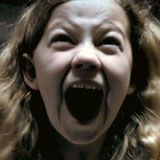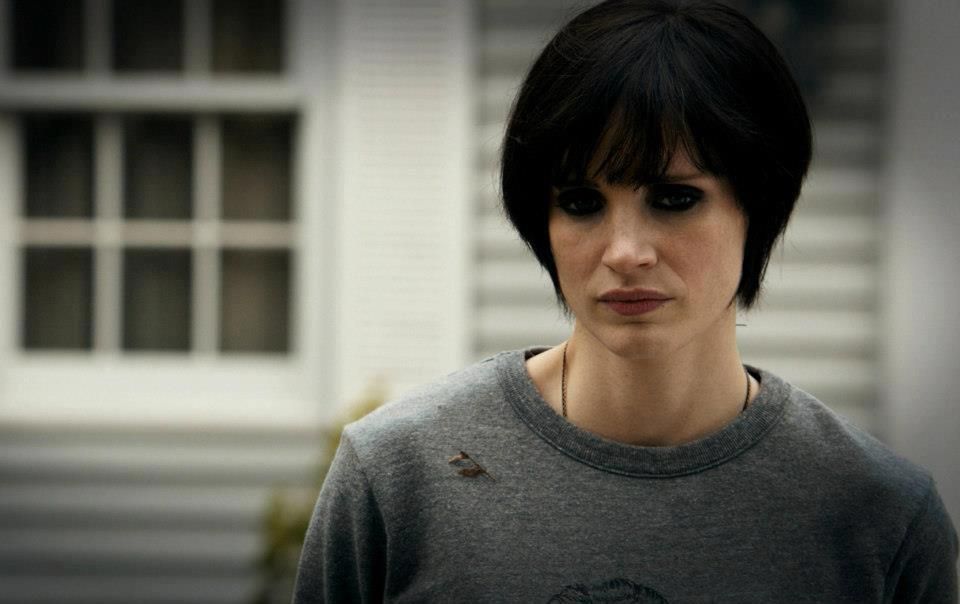Mama, the new supernatural thriller from director Andres Muschietti and producer Guillermo del Toro, is an enjoyable but flawed film, a charming scare-fest dragged down by poor character development and an inability to trust its audience.
After a businessman snaps, kidnaps his two young daughters Victoria and Lilly (played by Megan Charpentier and Isabelle Nelisse) and disappears into thin air, his brother Lucas (Nikolaj Coster-Waldau) sinks all of his money and time into trying to locate the missing family. Five years later, his obsession has pays off as his nieces are discovered living feral in the woods, with no trace of their father. Although Lucas immediately sues for custody, his musician girlfriend Annabel (a very goth Jessica Chastain) is less than thrilled with the prospect of raising two traumatized girls.
A woman who practically throws a party after a negative pregnancy test and an “artist” who devotes all her free time to her (astoundingly terrible) band, Annabel becomes even more reluctant to serve as the girls’ caretaker after learning that only Victoria can speak,
Lilly’s version of “playing” involves screaming and clawing at people, and both claim an invisible entity named “Mama” took care of them in the forest.
Despite the insistence of the girls’ shady therapist (Daniel Kash) that Mama is a figment of their imaginations, Annabel quickly realizes Mama is real, Mama is still visiting the girls ... and Mama is not happy about Annabel taking her place.
The best thing about the Universal Pictures film, like most of those del Toro is associated with, is the monstrous Mama herself. She’s initially glimpsed out of the corner of the eye or hovering just out of focus, but when we finally do get the unencumbered view of the monster she’s exactly as terrifying as those flashes suggests. Ghosts, as the movie reminds us loudly and frequently, are just twisted emotions, and Mama is both the raw, furious power of motherhood and what a person turns into when humanity is swept away and only instinct is left. Although she’s as protective of the girls as a mother bear, Mama is also as brutally amoral as an animal, as ready to punish her “offspring” as she is to shield them.
Equally fun is how the film plays with the idea of the monster in the closet, as Mama slithers under beds and behind open doors. Muschietti and co-writer Barbara Muschietti do a terrific job transforming Mama from horror-movie beast to three-dimensional character, all the more impressive by the fact that Mama speaks just once. By the time the film reaches its intense conclusion, you find yourself wondering whether life with Mama would be so bad -- or afterlife, as the case may be.
Outside of Mama, the film rests on the shoulders of child actors Charpentier (the older and more human Victoria) and Nelisse (the frighteningly feral Lilly). Kudos to Charpentier, who imbues Victoria with a tense energy as she’s forced to choose between worlds: Exist in an endless childhood with Mama or embrace adulthood and normal human life with Annabel. Even more impressive, Charpentier portrays Victoria’s dilemma with clarity and understanding lacking from the adult cast. Her need to be loved yet push love away for other’s protection drives the film’s emotional beats and gives Mama an effective way to dredge up fear. When a child’s declaration of “I love you” raises a gasp of horror from the audience, your main character and your monster are doing something right.
This attention to character disintegrates when it comes to the rest of the cast. Chastain’s Annabel shines brightest when interacting with the kids, her apathy coming across clearly as she, Lilly and Victoria trade some of the film’s funniest lines. Unfortunately Mama feels the need to drive home with a sledgehammer the message that Annabel doesn’t want kids. By the second act you can assemble a pretty good drinking game, taking a shot each time Chastain tells someone she’s not “ready” for kids or she just wants to “play her music,” OK? There are also far too many cringe-worthy scenes of Shady Therapist and a Spooky Old Woman throwing exposition at us, explaining and re-explaining and re-re-explaining what a ghost is (she’s twisted emotion, we get it!) and giving Mama a predictable and uninspired origin.
Mama also has a real problem with those possessing Y chromosomes. Although the female characters are fleshed out, the men seem only to exist because someone told the filmmakers there should be guys in the picture. Time is devoted in the first act to establishing that Shady Therapist has Ulterior Motives, but the film never goes anywhere with this. Lucas is told by his own ghostly visitor to save the kids, but instead of doing that he stumbles around the forest off-screen for two acts. The film tells us these male characters are important but they never follow through; it’s one thing to set up false expectations, but it’s another to abandon them.
Ultimately, there seem to be two films warring for our attention. The first Mama is a charming and delightfully creepy examination of womanhood and what it means to love. The other is a wordy slog that thinks the concept of “ghost” is too complicated for the audience to grasp. Although there’s a lot to love about Mama, the film would have been better off if all other characters and plot developments were jettisoned in favor of the engaging Annabel/girls/Mama conflict. It’s a shame that Muschietti is compelled to bury his unique ghost story under a mountain of exposition, and not even the most tender Mama/Lilly scenes can make up for his reliance on tired Hollywood horror tropes.
For horror buffs and those willing to watch whatever del Toro puts his name on, there’s great fun to be had in Mama. For everyone else, however, this is one for the Netflix queue.
Mama opens Jan. 18.


